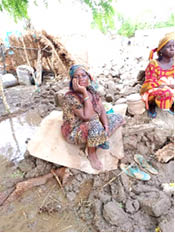Yobe is one of the North Eastern states in Nigeria with an estimated population of 4 million people, a 42 per cent increase from the 2.3 million declared during the last census in 2006.
The state is geographically located in a fragile ecological zone often prone to threats of desertification and other forms of environmental degradation such as drought and erosion.
However, one of the biggest challenges experienced in the state annually is the occurrence of severe thunder, rainfall and windstorms, which always destroy homes and cause serious damage to many other structures.
Recall that in 2022, the Yobe State Emergency Management Agency (YOSEMA) said flooding, heavy rainfall and windstorms affected 31,262 households, killed 72 persons and injured 200 others. This was in addition to 10 roads and drainage systems linking towns and villages being washed away across 255 communities in the 17 LGAs of the state.
Following this, the situation has deteriorated, forcing many residents to either live with the situation by fixing their houses annually or migrate to places within or outside the state.
For 2024, the Executive Secretary of YOSEMA, Dr Goje Muhammad, said that in the last three months, precisely from April to June, of 2024, windstorms and rainfall rendered 10,845 individuals homeless.
Goje said that based on the agency’s findings, a total of 14,082 rooms, mostly mud rooms, walls and toilets in 47 communities across 12 LGAs were destroyed by the disaster.
He said in the worst affected seven LGAs of Damaturu, Nangere, Nguru, Bade, Yunusari, Fika and Gulani, the incident led to the displacement of over 1,385 households, affecting 1,969 shelters and that nine deaths were recorded in four LGAs.
Some of the residents of the affected communities said the need to protect the environment and conserve the depleting forest resources was a necessity if the government wanted to guard their lives against the disaster.
Haruna Abdu, a resident of one of the affected communities, told Daily Trust that the situation had deteriorated over the years as a result of human activities like deforestation for firewood and periodic drought, all of which had culminated into the present condition.
The Ward Head of Jijigogazai in Nangere LGA, Ibrahim Jibrin, told Daily Trust that torrential rains and windstorms led to the destruction of buildings and property, as well as loss of many lives.
He said, “As usual, this year too we have recorded another disaster of windstorm and heavy rainfall that destroyed many houses and shops, including the loss of lives in my domain. At least five houses were destroyed. Also, some parts of 10 houses and rooms have collapsed while about 20 shops were destroyed.
‘‘The issues of severe thunder, rainfall or windstorms have been here almost every year. We are always vulnerable to these challenges. Ii wasn’t like this 20 years ago, because there were enough trees which covered almost all parts of the state.”
A resident of Pakarau village, Isah Hudu, told Daily Trust that a devastating windstorm and heavy rain wreaked havoc on his house, causing two rooms to collapse and resulting in other property loss.
He said, ‘‘I lost one of my family members to the tragedy. He was sleeping in a room when the building collapsed and he died on the spot. Two of my children were injured too as a result of the disaster that has been happening almost annually.”
For Halima Muhammad, a mother of four who lost almost everything except a few items that were not in the rooms when the incident occurred: ‘‘I lost almost everything to this tragedy; my building is still standing, but all the roofing is gone. I am currently staying with relatives because I don’t have a space in the home to stay. It was a very bad day for me.”
A resident of Garin Dashu village, Adama Muhammad, a mother of five, told Daily Trust that, ‘‘I, my husband and our five children were sleeping in the room when the incident happened. The sound of a thunderstorm woke me up, and subsequently, the windstorm uprooted the roofs of our rooms. When we saw what was happening, my husband and I evacuated our children by taking them to one of my brothers. Although my husband returned to the destroyed house, I slept with my brother’s wife and her children.”
She further said, “Windstorms have been destroyers in this settlement in the last two years. It was the same windstorm that destroyed the wall of our house, but unfortunately, we have seen the worst this year.”
Experts suggest shelterbelts
Experts have attributed the problem in Yobe to climate change and deforestation, saying most of the areas in the state were affected by desertification and were prone to wind erosion and suggested a holistic approach to confront the problem.
Mallam Ahmed Muhammad Abubakar, a climate change expert, said, ‘‘We are in a frontline state where our rainy season is characterised by windstorms, dunes and dust. So, these strong winds normally need shelterbelts that will reduce their velocity so that they do not cause disruptions in settlements.”
He noted the lack of trees that served as shelterbelts to reduce the velocity of the winds before they reached communities and destroy houses, schools and lives.
He further said, “What we need to do is to embark on massive tree planting so that we have windbreaks, which are called shelterbelts.”
He disclosed that the state government was planting trees and that they always made sure that they planned green so that they could establish shelterbelts in areas where winds were heavy.
Meanwhile, the state government is said to have planted three million trees and handed them over to locals for ownership and sustainability through the formulation of a comprehensive climate change action plan for the state.

 Join Daily Trust WhatsApp Community For Quick Access To News and Happenings Around You.
Join Daily Trust WhatsApp Community For Quick Access To News and Happenings Around You.


